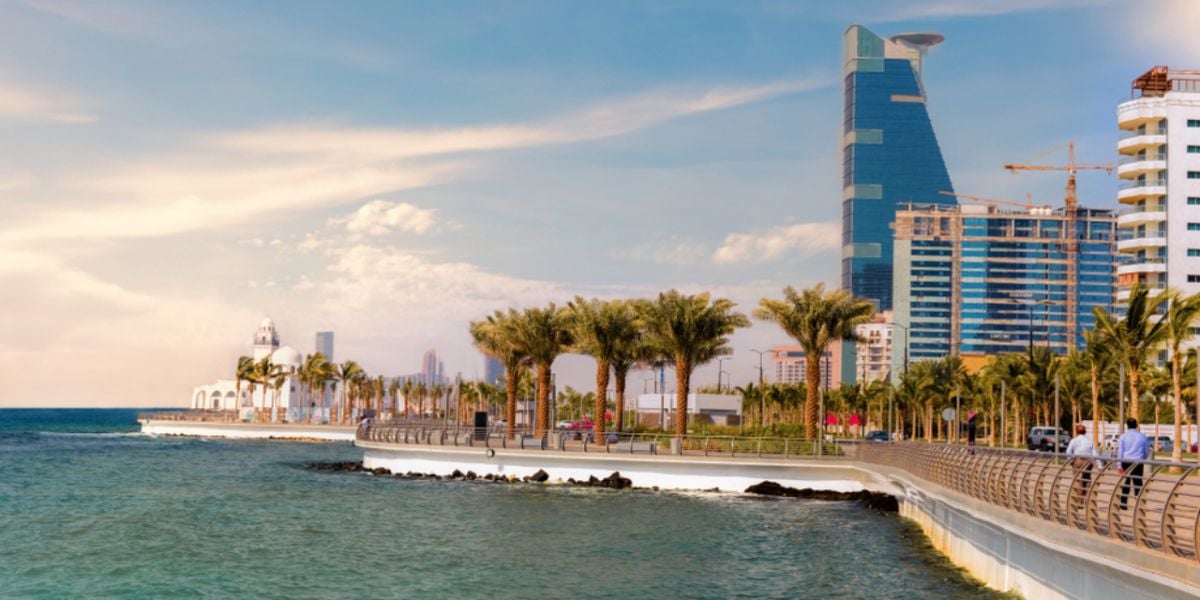
Just a few years ago, Saudi Arabia was known as very selective in its acceptance of visitors — and traveling to Saudi Arabia for tourism used to be an impossible task. In 2019, everything changed — Saudi Arabia opened up for tourists, and many of the strict rules for expats working and living here and for the visitors were abolished. With more and more international and regional events, conferences, and conventions being hosted in Saudi Arabia, there is an increasing number of tourists entering the Kingdom on tourist visas.
So, what is it like to move to Saudi Arabia? This is what we are looking into in this article.
How to travel to Saudi Arabia
If you are going to visit Saudi Arabia, you will be invited into the country under one of the many visa allowances, depending on the nature of your travel. Keep in mind that you cannot use tourist visas for other purposes other than tourism and visiting friends or family.
The majority of foreigners traveling to Saudi Arabia are still driven by business reasons or employment opportunities. With the economy rapidly developing, companies, schools, and ventures are seeking talent globally, offering expats attractive contracts to live and work in Saudi Arabia.
Many foreigners also have the ability to travel to Saudi Arabia for the Muslim pilgrimage to visit the holy sites.
Types of visas for Saudi Arabia
When looking to travel to Saudi Arabia, one of the following visas may apply to your stay:
- Tourist Visa;
- Business Visa;
- Work or Residence Visa;
- Transit Visa;
- Family Visit Visa;
- Student Visa;
- Service Visa;
- Religious Visa.
The government is launching a platform for all different visa types. It is currently in beta but should gather all the information for your visa needs in the future.
How to apply for a tourist visa to Saudi Arabia
As we've mentioned at the beginning of this article, Saudi Arabia used to be a closed country that didn't allow tourism-based travel. However, since 2019, the Kingdom has been granting tourist visas to international travelers.
The application process and requirements for obtaining a tourist visa to Saudi Arabia differ depending on which country you are from. There are two types of tourist visas travelers can apply for based on their country of residence: E-visa and Consulate Visa.
The eVisa is valid for one-year, allows multiple entries and stays of up to 90 days in the country. It excludes activities such as studying and performing Hajj (the annual pilgrimage).
To apply for an E-Visa to Saudi Arabia, you need to be a resident of one of the following countries:
Africa - Mauritius, Seychelles, and South Africa
America - Bahamas, Barbados, Grenada, Panama, Saint Kitts and Nevis, Canada and the United States
Asia - Brunei, China (including Hong Kong and Macau), Kazakhstan, Malaysia, Singapore, South Korea, Japan, Azerbaijan, Kyrgyzstan, Maldives, Tajikistan, Thailand, Türkiye, Uzbekistan.
Oceania - Australia and New Zealand
Europe - Albania, Andorra, Austria, Belgium, Bulgaria, Croatia, Cyprus, Czech Republic, Denmark, Estonia, France, Finland, Georgia, Germany, Greece, Hungary, Iceland, Ireland, Italy, Latvia, Liechtenstein, Lithuania, Luxembourg, Malta, Monaco, Montenegro, Netherlands, Norway, Poland, Portugal, Romania, Russia, San Marino, Slovakia, Slovenia, Spain, Sweden, Switzerland, Ukraine, and the United Kingdom.
An E-Visa can also be obtained on arrival, provided you come through one of the following ports of entry:
- King Khalid International Airport (Riyadh);
- King Abdul-Aziz International Airport (Jeddah);
- King Fahad International Airport (Dammam);
- Prince Mohammed bin Abdul-Aziz International Airport (Madinah);
- King Fahad Causeway;
- Al Bathaa Land Port.
Important:
Make sure to check with your Saudi Arabia embassy or consulate if you qualify for a visa on arrival prior to making your travel plans.
If your country of residence is not on the list above, you will need to apply for a visa via the Saudi Arabia embassy or consulate in your home country.
Good to know:
US and Schengen visa holders may receive their visas upon arrival at the ports mentioned above of entry under the condition that their US or Schengen visa has been used at least once.
To apply for a tourist visa to Saudi Arabia via a consulate or embassy, you will generally need to provide the following documents:
- A properly filled-in application form;
- A passport valid for at least six more months from the date of application;
- Health insurance purchased from Saudi Arabia: you will see the list of options for local health insurance providers once your Enjaz form (an online application for a Saudi visa) has been processed;
- Proof of accommodation for the duration of your stay: hotel or residence;
- Visa fees (around USD 123, including insurance);
- Roundtrip ticket and travel itinerary;
- Proof of employment;
- A bank statement to prove your financial solvency;
- Personal information, including your current home address.
The visa you receive will be valid for up to one year and will grant you a maximum of 90 days of stay in Saudi Arabia. Visas are granted for both single and multiple entries.
Important:
All visa application fees for Saudi Arabia are non-refundable.
If you make errors in the information you provide, you will need to correct it through the official website—and not the Saudi Arabia embassy or consulate.
If you plan to get a visa on arrival at one of the approved ports of entry, make sure you have with you a valid credit card that can be used internationally.
How to apply for a business visa to Saudi Arabia
If you are planning to move to Saudi Arabia for business, you will need to apply for a business visit visa. Here's what you will need:
- Your original passport, valid for no less than six months from the date of application;
- A properly filled-in online application or paper application at the local embassy or consulate;
- An invitation letter from a Saudi company;
- Employment verification letter,
- Paid visa fees.
How to apply for a family visa to Saudi Arabia
If you are traveling to Saudi Arabia to reunite with or visit family, you will need to apply for a family visa. Here's what you will need:
- Your original passport valid for no less than six months from the date of application;
- A properly filled in online application or paper application at the local embassy or consulate;
- Proof of relationship between the applicant and the inviting party.
How to apply for a student visa to Saudi Arabia
To apply for a student visa to Saudi Arabia, you will need to provide the following:
- Your original passport, valid for no less than six months;
- A filled-in online application on the Ministry of Foreign Affairs website;
- Original birth certificate;
- Original high school diploma (one copy). The copy of your diploma must receive Saudi culture attestation—inquire at your local Saudi embassy or consulate about where this can be done in your country;
- Three copies of a medical report including all lab results. Note that your medical report must be issued by a licensed physician and certify that you are free of all contagious diseases. Your physician must sign all copies of your medical report and indicate their license number and address. The medical report you present must not be over three months old;
- Three passport-sized colored photos on white background;
- Police report, issued within six months prior to the date of application.
How to apply for a religious visa to Saudi Arabia
Religious visas to Saudi Arabia are given out to Muslims who want to perform Umrah or Hajj (forms of pilgrimage). Note that it is also possible to perform Umrah on a tourist visa. However, you will need a Hajj permit for Hajj. The centers for these activities are the cities of Makkah and Madinah.
Pilgrims are required to book their hajj trip through a Saudi government-approved hajj travel agent.
Visa application process for Saudi Arabia: general requirements
It is important to know that the application process for foreigners differs for each country. You are, therefore, advised to check the specific application requirements for your home country.
All visa applications for Saudi Arabia include similar requirements. You will have to complete a comprehensive health evaluation and submit all the results with your application. This includes an HIV test that is mandatory for all applicants.
A recent police clearance report of less than 6 months will also be requested in the application process. All religious beliefs need to be clearly stated in the application process. Note that any stamps of Israel visits in your passport will automatically deny you a visa.
Religious pilgrims in Saudi Arabia will have authorized access to Medina and Mecca. Note that these are considered sacred places and are prohibited to non-Muslims.
In regards to your passport's validity requirement, it should be confirmed with the Saudi representation in your home country.
If you have a sponsorship or guarantee letter to travel to Saudi Arabia, you are advised to request your sponsor to specify the maximum number of days you are authorized to stay in the country. In fact, the visa validity period starts as of the date of issuance of the visa.
Customs regulations for traveling to Saudi Arabia
- While traveling to Saudi Arabia, you are strictly forbidden from carrying the following products: pornographic materials
- alcoholic beverages
- pork and all related products
- prohibited drugs
- Firearms, explosives, and knives
- religious objects other than the Islamic ones.
Also, any medication must be accompanied by a prescription.
Useful links:
Ministry of Foreign Affairs of the Kingdom of Saudi Arabia
Zakat, Tax and Customs Authority
We do our best to provide accurate and up to date information. However, if you have noticed any inaccuracies in this article, please let us know in the comments section below.








